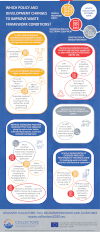Guidelines and policy recommendations
The guidelines provide recommendations for local waste collection systems to better assess their situation and improve their performances. They include practical recommendations as well as more concrete illustrations on how local players succeeded in tackle local challenges and improve their performances.
Executive summary available here
 COLLECTORS policy recommendations
COLLECTORS policy recommendations
The policy recommendations list propositions on how to improve national and regional framework conditions. They address six key topics and challenges highlighted by the project and provide different propositions to improve the EU, national, and regional frameworks so that local players can implement successful, economically-viable waste collection systems.
Executive summary available here
Discover the infographic presenting COLLECTORS policy recommendations !
Inventory of waste collection systems
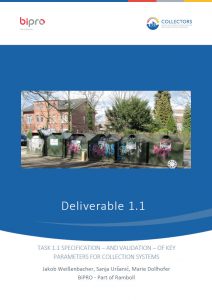 D1.1-Specification and validation of key parameters for collection systems
D1.1-Specification and validation of key parameters for collection systems
This first report presents the method used to identify the key parameters allowing to document the collection systems that will be included in COLLECTORS’ database, which will be use for the identification of good practices. The list of parameters is presented as well.
Executive summary available here
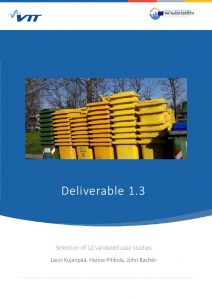 D1.3 Selection of case studies
D1.3 Selection of case studies
This report describes the approach and methods used for identifying a group of potential cases of collection systems that could be studied during the project, taking into considerations contexts that prove to be challenging and performance indicators that allow the identification of well-performing cases.
Executive summary available here
Analysis of waste collection systems
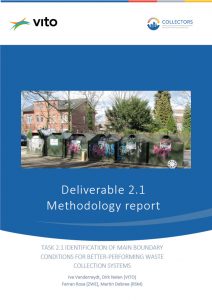 D2.1 Methodology report on the boundary conditions
D2.1 Methodology report on the boundary conditions
The COLLECTORS project conducted research to identify the role of waste collection systems within the recycling value chain, and determine what conditions lead to the collection of more quantities of quality materials, in order to produce more value to the recycling chain. This report details the method used to identify these “boundary conditions”.
Executive summary available here
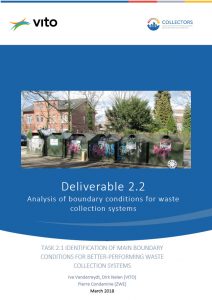 D2.2 Analysis of boundary conditions for waste collection systems
D2.2 Analysis of boundary conditions for waste collection systems
This report focuses on the identification of “boundary conditions” for waste collection system to positively contribute to the circular economy, e.g. by producing sufficient quantities of sorted materials available for high quality recycling. It focuses on the three waste fractions covered by the project: paper and packaging waste, WEEE, and construction and demolition waste.
Executive summary available here
 D2.3 – Minutes of three focus groups meetings
D2.3 – Minutes of three focus groups meetings
This report includes the minutes of the three focus group meetings organised by the project to better understand the perspective of inhabitants on municipal waste management.
D2.4-Report on solutions for tackling systemic and technical boundary conditions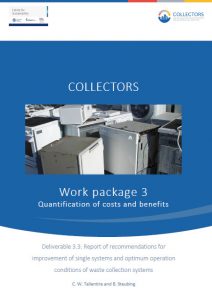
This report analyses how and to which extent the waste collection systems in 12 selected case studies provide specific solutions to improving the quality of the collected waste in order to enable sorters and recyclers to produce better quality secondary materials.
Executive summary available here
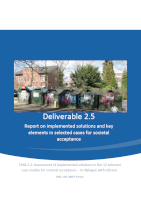 D2.5 – Report on implemented solutions and key elements in selected cases for societal acceptance
D2.5 – Report on implemented solutions and key elements in selected cases for societal acceptance
This report proposes an analysis on the strategies set by the COLLECTORS case studies to ensure the social acceptance of waste collection systems. It also presents the conclusions of three focus groups bringing together inhabitants in three different locations in Europe.
Quantification of costs and benefits
 D3.2-Report on the economic and financial performance of waste collection systems
D3.2-Report on the economic and financial performance of waste collection systems
This report provides the financial assessment of 12 case studies on waste collection in Europe, conducted by means of a Cost Benefit Analysis (CBA). It analyses the financial flows behind the operation of good and interesting practices in municipal waste collection, gives insight into the overall performance of the 12 case studies, and highlights the options of and incentives for different stakeholders to invest in a better performing system.
Executive summary available here
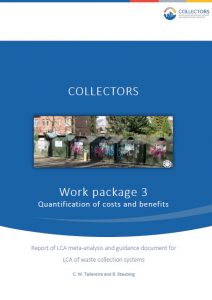 D3.1 Report of LCA meta-analysis and guidance document for LCA of waste collection systems
D3.1 Report of LCA meta-analysis and guidance document for LCA of waste collection systems
This report provides a methodology and thus guidance for performing life cycle assessment (LCA) studies for waste collection systems. The methodology adopts a broad systemic perspective to capture not only the potential environmental impacts generated by the WCS themselves, but also the consequences for resource recovery and substitution of primary production inputs.
Executive summary available here
 D3.3 Report of recommendations for improvement of single systems and optimum operation conditions of waste collection systems
D3.3 Report of recommendations for improvement of single systems and optimum operation conditions of waste collection systems
This report provides the environmental assessments of 12 case studies on waste collection in Europe, applying the Life Cycle Assessment method described in D3.1. It analyses how improving muncipal waste collection can reduce the environmental impact for the three waste fractions covered by the project.
Executive summary available here
Multi-criteria Decision Making
D3.4 Report on the multiple criteria assessment of the studied waste collection systems and applicability of different methods for decision support
This report presents the main findings of four COLLECTORS workshops and multicriteria decision-making (MCDM) exercises; analyses challenges related to the studied decision-making situations; and provides recommendations about the use of MCDM methods in the context of waste management and collection.
Executive summary available here
 D4.4 Report on generalized criteria to support decision-making
D4.4 Report on generalized criteria to support decision-making
This report presents examples and recommendations about informative criteria that could be used for monitoring the performance of a waste collection system, comparing collection systems in different regions and evaluating the impacts of alternative collection strategies (or means of collection). Additionally, this report includes recommendations about criteria that could be used for identifying potential benchmarks among other systems, taking into account relevant regional characteristics.
Executive summary available here
Clustering with other project
 D6.1 Report with a short introduction on the identified projects
D6.1 Report with a short introduction on the identified projects
The report covers the mapping of relevant EU-projects to ensure uptake of state-of-the-art knowledge in the project and avoid duplication of research actions.
Executive summary available here
 D6.2 Three customized factsheet finalized
D6.2 Three customized factsheet finalized
This report covers the factsheets drafted for the projects COLLECTORS has clustered with; LCA4Regions, PLASTECO, PolyCE, PROMPT and RethinkWaste. All factsheets contain a description of and hyperlink to the relevant COLLECTORS tools/reports for the project in question, and a tailored section on knowledge sharing how COLLECTORS results can be used within the clustering-project.

